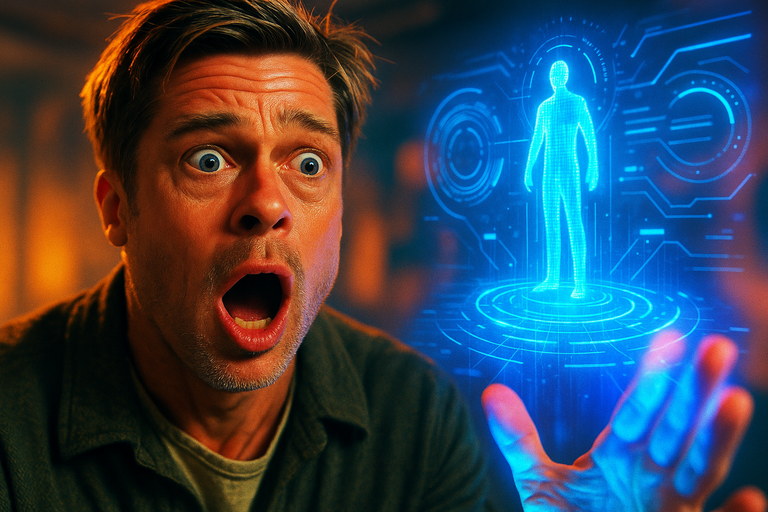
What if your favorite Brad Pitt sci-fi films are actually the blueprint for tomorrow’s storytelling?
Sounds like a bold claim, right? But stick with me. Whether you’re a die-hard fan, a casual movie buff, or a digital storyteller itching for inspiration, you’ll never look at Pitt’s filmography the same way again.
The Brad Pitt Sci-Fi Phenomenon: More Than Just Box Office Hits
You’ve probably seen at least one of his genre-bending classics—maybe the mind-bending chaos of 12 Monkeys, the surreal existentialism of Meet Joe Black, or the ageless heartache in The Curious Case of Benjamin Button. But what if I told you these films aren’t just Hollywood eye-candy? They’re milestones in the evolution of digital storytelling.
A recent Gizmodo article breaks down Brad Pitt’s most influential sci-fi roles, ranking him from “time-warped” to “timeless.” But let’s dig deeper. What do these films teach us about the current—and future—state of narrative arts?
1. Immersive Worlds & Mind-Bending Narratives: The Rise of Complex Story Structures
Think about Fight Club (yes, it’s secretly sci-fi!) and 12 Monkeys: two films that force viewers to question reality. With non-linear storytelling, unreliable narrators, and twisty timelines, these movies predate the complexity we now expect from binge-worthy digital series and interactive games.
Why does this matter now? Because in 2025, audiences crave stories that engage both their intellect and imagination. Filmmakers and digital creators are borrowing heavily from these layered narratives, crafting experiences that invite viewers to choose their own adventure and revisit stories from new angles.
2. Character-Driven Digital Storytelling: From Blockbusters to Bytes
Pitt’s characters—whether Benjamin Button aging backwards or Joe Black straddling life and death—demand more than passive consumption. They spark empathy, provoke questions, and fuel online debates.
Today’s digital platforms—from TikTok narratives to interactive fiction apps—are built around that very principle: authentic, unpredictable characters pull us in. The world may be pixelated, but heart and conflict remain king.
3. Aging, Identity, and the Tech-Enhanced Human: Sci-Fi Themes Go Mainstream
Remember how Benjamin Button explored the nature of time and identity? Or how Ad Astra plunged into the psychological toll of interstellar travel? Fast-forward to today’s landscape, and you’ll see these themes everywhere—from AI-generated avatars questioning their souls to VR experiences that let us embody anyone, anywhere.
In 2025, digital storytelling isn’t just about flashy technology. It’s about pushing the boundaries of what it means to be human—just as Pitt’s roles have done for decades.
4. Transmedia Storytelling: Pitt’s Legacy in the Era of Story Universes
Here’s where things get really interesting. The best sci-fi tales don’t live in a vacuum—they expand across media. Consider how fan theories, viral marketing, and alternate reality games spun Fight Club and 12 Monkeys into cultural phenomena.
Today’s studios, streaming platforms, and indie creators are all-in on transmedia narratives—where a story might begin on film, splinter into webisodes, then come alive in interactive online communities. Pitt’s classics laid the groundwork for the immersive, participatory worlds we now call the “storiverse.”
5. Collaboration Is Everything: Bringing Storytellers Together
Perhaps the biggest lesson? None of these films exist in isolation. They’re the product of creative teams—directors, writers, visual artists, sound designers—working in harmony to craft unforgettable worlds.
And that’s exactly the kind of ecosystem that organizations like The Infinite Dude Media are nurturing right now. By connecting storytellers, sharing resources, and spotlighting innovative projects, they’re helping to ensure that the next “Brad Pitt-level” narrative breakthrough won’t just come from Hollywood—it could come from anywhere (including your own laptop).
So, What’s Next for Sci-Fi and Digital Storytelling?
As we look back on Brad Pitt’s most influential sci-fi roles, one thing becomes clear: every new media revolution stands on the shoulders of those who dared to imagine differently.
Here’s your challenge: Watch one of Pitt’s classics this weekend, then ask yourself—how would this story play out on today’s digital platforms? Could you remix it as an interactive TikTok series, a VR narrative, or a branching podcast?
Join the conversation: What do your favorite sci-fi stories say about the future of narrative arts? Drop your thoughts below and let’s build the next chapter of the storiverse—together.